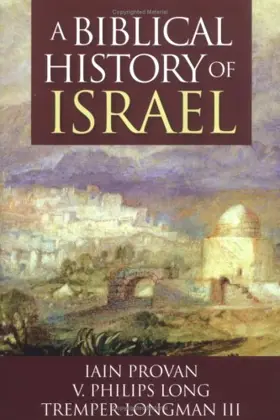

A Biblical History of Israel
Pages
416
Publisher
Westminster John Knox
Published
8/1/2003
ISBN-13
9780664220907
In this much-anticipated textbook, Iain Provan, V. Philips Long, and Tremper Longman have written a history of ancient Israel that takes the biblical text seriously as an historical document. While also considering nonbiblical sources and being attentive to what disciplines such as archaeology, anthropology and sociology suggest about the past, they do so within the context and paradigm of the Old Testament canon, which is held as the primary document for reconstructing Israel’s history.
Reviews
An Evangelical historiography.
[Full Review]
What would a classicist think about being offered a Homeric History of Ancient Greece? Or how would American historians react to a Book of Mormon History of Pre-Columbian America? To be confronted with a Biblical History of Israel seems to turn back the clock to an earlier age, when �biblical archaeology, � �biblical history,� �biblical this,� and �biblical that� still roamed th e earth. The authors of this study either want to turn the history of our profession back a couple of generations or they know something most of the rest of us do not. To be fair, a full 25 percent of this book is�at first blush� devoted to telling us what a �biblical history� of Israel is and why it is a justified approach. A crisp, to-the-point discussion of approaches to historiography and the principles on which this history was written would have been most welcome. Instead, we get about a hundred pages (out of less than four hundred of text in the book as a whole) of meandering discussion about how historiography has developed, the current crisis of historiography in the history of ancient Israel, how biblical scholars are out of touch and still in the nineteenth century, how historians as a whole have overlooked important principles, and, finally, a few pages of discussion of what is meant by �a biblical history� and the authors� particular approach to writing this history. Their definition seems to be the following.
[Full Review]
Histories of Israel have changed. Those of us who cut our historical teeth on works such as John Bright�s History of Israel had no idea that there was any sort of debate about the nature of historiography. After a prologue in which Bright briefly surveyed the history of the region, he went straight into a discussion of Israel�s or igins, reaching back to the patriarchal age, albeit a discussion that did not necessarily read everything in Genesis at face value. But Bright�s third edition (1980) wa s issued at almost precisely the point at which things began to change, and wider considerations within the field of historical studies generally began to take hold in the discussion of the history of Israel. In terms of approach, Bright was not always far removed from those who succeeded him in the field, but the early 1980s were a time when methodological questions began to come to the fore, and it became an important component in the writing of a history to indicate the conclusions that had been reached to these questions before one moved into the actual writing of Israel�s history. At the same time , there was a new interest developing in the literary form of the Old Testament, interest that was kindled by works such as Robert Alter�s The Art of Biblical Narrative, so that the texts themselves began to be studied by posing some of the questions that might traditionally have been asked of prose fiction.
[Full Review]

